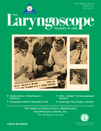Abstract
Objectives/Hypothesis:
To gather qualitative and semiquantitative information about catastrophic complications during and following tracheotomy.
Study Design:
National survey distributed to American Academy of Otolaryngology–Head and Neck Surgery members via the Academy weekly email newsletter during April and May 2011.
Methods:
A total of 478 respondents provided estimates of the number of four specific tracheotomy-related complications (innominate artery fistula, esophageal fistula, acute tracheotomy occlusion, and obstructing granuloma), all catastrophic events, and events resulting in death or permanent disability encountered during their careers. There were 253 respondents who provided 405 free-text descriptions of specific events.
Results:
The respondents experienced approximately one catastrophic event every 10 years and one event resulting in death or permanent disability every 20 years. More than 90% occurred more than 1 week after surgery. Categories of physicians who experienced more events per year included academic physicians and laryngologists. Pediatric otolaryngologists had twice as many innominate artery fistulas per year of practice as others. Qualitative (free-text) descriptions of the most serious events demonstrated that more of these events involved loss of airway and volume bleeds, usually from innominate or carotid artery erosion. Many of the events due to airway loss involved potentially correctable deficits in family education, nursing care, home care, and other structural factors.
Conclusions:
Even when we allow for selection bias, these data suggest that a substantial number of tracheotomy complications leading to death or permanent disability occur at a national level. The vast majority of events occur more than 1 week after the procedure. Many of the described events were caused by factors that should be amenable to prospective system improvement strategies. Laryngoscope, 122:30–37, 2012




